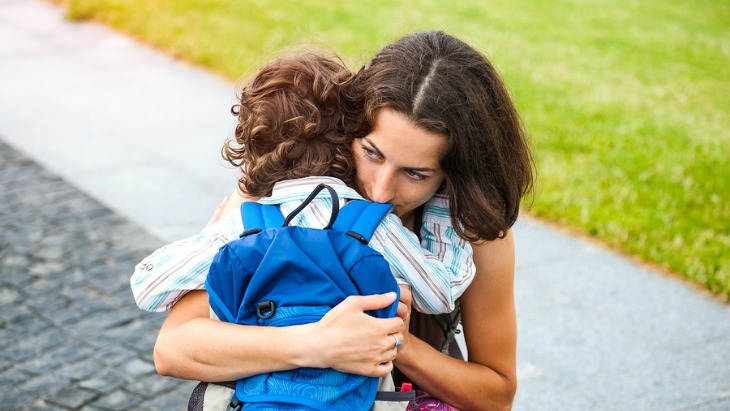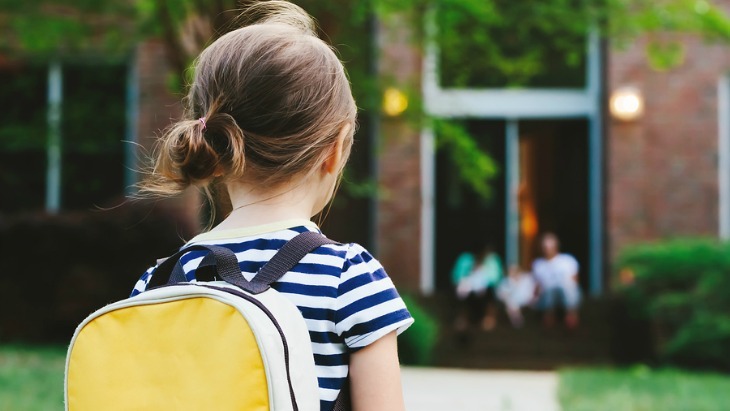Starting Big School? 8 Small Steps To Help Ease The Way
- Preschoolers
Parents Only

By: Leanne Fine
Starting big school. Year K. The all new and unfamiliar. It can be daunting and stressful for children and parents alike. And for some, it’s not too many sleeps away.
If the thought suddenly hits you like a ton of Lego bricks, you’re not alone.
“Big transitions, like starting big school, presents a time of risk and vulnerability to your child, and your family,” explains Christina Thai, Clinical Psychologist at the University of Sydney’s Child Behaviour Research Clinic.
“Starting big school is hard because it is physically bigger, there are new and different rules and procedures, new faces, and relationships change. Learning is more formal and even routine at home changes.”
And, because of the link between starting school well and a positive outcome for children later in life (Dockett and Perry, 2006), there’s an extra layer of pressure on parents.
So, with thanks to the University of Sydney’s Child Behaviour Research Clinic, we’ve put together a shortlist of tips, insights and practical examples. We hope these will help smooth the way in the lead up to exciting and wonderful Year K.
1. Children Rarely Choose Change
Children don’t ask for change, adults usually just tell them it’s going to happen to them. So allow as much time as your child may need to process and plan the change. Be ready to answer questions as your child seeks out information. Talk about big school and explain what the change will involve, without information overload.
Walk in your little one’s shoes to answer questions like: Who will pick me up? Where will I be picked up from? What is for lunch? Who will I play with? How do I make new friends? Where’s the bathroom?
2. Children Learn Coping Skills From Parents
Your child, from very young, will mimic your facial expressions, and feed off your emotions in any situation. Research shows that children look to parents for emotional cues to help them interpret ambiguous situations (Boccia and Campos, 1989).
This means, as parents, we should be aware of our feelings going through any transition, and try to present a confident and positive attitude about the change wherever possible.
3. Transitions Have Three Stages: Preparation, During, After
In other words: What is the change? What is the impact? What is expected to happen?
For most children, simply explaining what is happening and what they can expect will be enough. However, some children may benefit from social stories and visual pictures so they are aware of what is coming next in the day.
To build in flexibility, particularly for children with Autism Spectrum Disorder, adding in a few question marks in between some of the pictures helps prepare for surprises that may happen - which can be exciting and good.

4. We’re In This Together, Communicate
Big transitions for kids are big transitions for the whole family. It’s a team effort.
Because starting school is stressful for everyone, keep the lines of communication open and discussions fun. Active listening and body language are crucial. Be interested, attentive and try to not interrupt.
And in asking questions, be mindful with your words. Try to avoid broad open-ended questions which can be hard to answer like ‘How was your day at school?’ Rather, try to be creative with questions like, ‘Who, from your new class, would you want to take with you to a deserted island?’
5. Reflect On Past Experiences To Help Find Solutions
Draw on, and speak about your own childhood experiences and fears, and how you overcame them. Also, remind your child of their previous transitioning success stories. For example, remind how quickly s/he made new friends and loved her/his new teacher when they started preschool.
Also, encourage children to think about their own solutions. So if they’re on the playground with no one to play with, ask what s/he thinks they can do.
6. Promote Independence And Self-Esteem
Involve your child in some controlled decision-making, like a fun shopping trip to buy new school stationery or a lunchbox. Also, pack some things together the night before school, and even lay out school clothes for the morning.
7. Be Clear On The Rules And Specific With Rewards
As an example, in starting big school, explain that they need to ask their teacher to go to the bathroom because there won’t be dedicated bathroom breaks. Also, praise them when they do something right describing their specific good behaviour. Real rewards motivates good behaviour (whether reward charts or cupcakes).
“Don’t forget,” Ms Thai added. “Children are motivated by their parents’ attention and love – this is the most powerful reward strategy.”
8. Be Patient And Kind, To Your Child And To Yourself
We all need time to settle into a major transition - no matter how good or bad the start. A child may be happy after the first day or week of big school, but may regress after a few weeks. Conversely, an unhappy start will also settle in time.
Remember help is available – chat to teachers if you are worried about how your child is settling in.
Through this all, be patient, kind, predictable and consistent. Maintain your usual set of family rules and rituals. And celebrate successes as a family, even the smallest ones - make them special, fun and together time.
The Child Behaviour Research Clinic is a treatment, teaching, and research clinic interested in developing, evaluating and disseminating state-of-the-art treatments for young children with behavioural and emotional problems. One of the main activities is to offer help to parents who would like to learn better strategies to assist in managing a child's behavioural difficulties. For more information, or to participate in one of their projects, please call (02) 9114 4326 or visit the website.
Reviews


